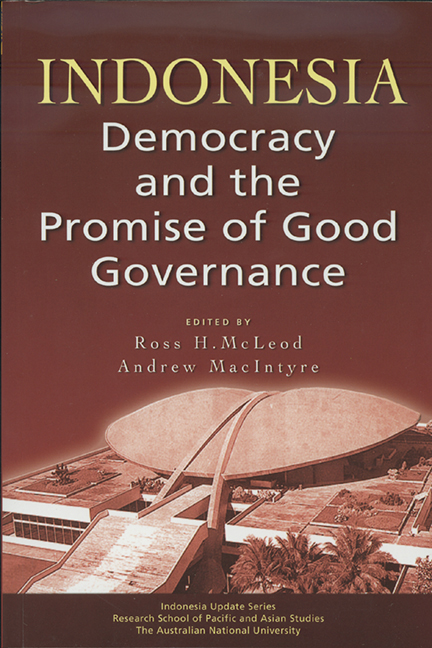Book contents
- Frontmatter
- Contents
- List of Tables and Figures
- List of Contributors
- Acknowledgments
- Glossary
- 1 Introduction
- PART I FORMING AND REFORMING THE ARCHITECTURE of GOVERNANCE
- PART II THE ROLES OF GOVERNMENT
- 5 The State and the Market in Democratic Indonesia
- 6 Government and Private Business: Rents, Representation and Collective Action
- 7 Muslim Politics in Indonesia's Democratisation: The Religious Majority and the Rights of Minorities in the Post-New Order Era
- 8 Children, Welfare and Protection: A New Policy Framework?
- PART III THE INSTITUTIONS OF GOVERNMENT
- Index
- INDONESIA UPDATE SERIES
7 - Muslim Politics in Indonesia's Democratisation: The Religious Majority and the Rights of Minorities in the Post-New Order Era
from PART II - THE ROLES OF GOVERNMENT
Published online by Cambridge University Press: 21 October 2015
- Frontmatter
- Contents
- List of Tables and Figures
- List of Contributors
- Acknowledgments
- Glossary
- 1 Introduction
- PART I FORMING AND REFORMING THE ARCHITECTURE of GOVERNANCE
- PART II THE ROLES OF GOVERNMENT
- 5 The State and the Market in Democratic Indonesia
- 6 Government and Private Business: Rents, Representation and Collective Action
- 7 Muslim Politics in Indonesia's Democratisation: The Religious Majority and the Rights of Minorities in the Post-New Order Era
- 8 Children, Welfare and Protection: A New Policy Framework?
- PART III THE INSTITUTIONS OF GOVERNMENT
- Index
- INDONESIA UPDATE SERIES
Summary
INTRODUCTION
One of the major dangers of democracy is the potential for ‘tyranny of the Majority’: the risk that certain groups may use their majority to promote their special interests at the expense of minorities. For example, a religious majority may seek to have the state impose its religious values on the entire population, resulting in the oppression of religious minorities. Many countries try to avoid this outcome by constitutional separation of religion from the state, such that their governments do not promote one religion over others, but act only to protect religious freedom where it is threatened.
The authors of Indonesia's constitution were well aware of the problem. Accordingly, the constitutional status of religion is set out in article 29 on religion, which stipulates simply that ‘The state is based on belief in One God’, and that ‘The state guarantees the freedom of all residents to embrace their own religion and to worship according to their own religion and beliefs’. Two aspects of these stipulations are worthy of emphasis. First, since no single religion is officially acknowledged in the constitution, Indonesia is certainly not a theocratic state. The government is required to follow a policy of neutrality towards all religions, and to provide a mechanism to afford equal rights to all citizens regardless of their religious persuasion. Second, the constitution confers religious rights on individuals, not on any religious community. Collective religious rights are no more than a natural extension of each individual's personal rights, so that the government should deal with its citizens individually, not as religious groups (Bell 2001: 795; Salim 2006: 100).
The history of religious majority–minority relationships in Indonesia has always been somewhat troubled, as article 29 has not been widely accepted as requiring a clear demarcation between religion and the state. Islam is the majority religion, and the Ministry of Religious Affairs was established in 1946 to provide autonomy for the Muslim community. The minister has always been a Muslim, and the Islamic section of the ministry the largest. At present each religious section has one director-general, except for the Islamic section, which has two–one for Islamic affairs and one for Islamic institutions.
- Type
- Chapter
- Information
- IndonesiaDemocracy and the Promise of Good Governance, pp. 115 - 137Publisher: ISEAS–Yusof Ishak InstitutePrint publication year: 2007



